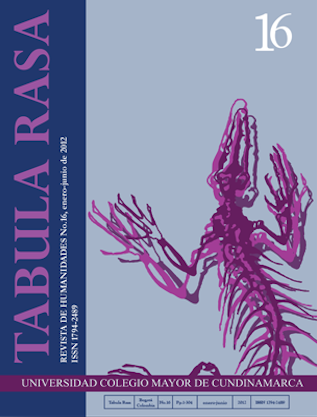Passing through Quijano, saving Foucault. Protecting white identities and decolonization
Pasar por Quijano, salvar a Foucault. Protección de identidades blancas y descolonización
Show authors biography
This paper addresses the debates linking Quijano’s theories (those of decoloniality) and Foucault’s. On one hand, it reaffirms the importance of those discussions in the Eurocentric academic sphere, and on the other hand, it argues that, in developing primarily within the academic sphere, they are at risk of reinforcing the core of stating colonial politics of being from a white identity by rendering it invisible. This paper uses Quijano and Foucault, both as the significant theorists they both are, and as geoand corpo- political metaphors, where Foucault inhabits a being zone, and Quijano a relatively non-being zone. Both of them inhabit the being zone in relation to indigenous and black populations. I arrive to the conclusion that while discussion on decolonial theories and Foucault bring into relief several important aspects contributing to decolonization, they are also debates passing through Quijano and saving Foucault, which means they stay in the being zone.
Article visits 78 | PDF visits 64
Downloads
Castro-Gómez, Santiago. 2007. «Decolonizar la universidad. La hybris del punto cero y el diálogo de saberes» en R. Grosfoguel y S. Castro-Gómez (eds.): Educación superior, interculturalidad y descolonización. La Paz, PIEB.
Castro-Gómez, Santiago. 2005. «Foucault. Lector de Marx». Universitas Humanistica. 59: 106-117.
D’Amico-Samuels, Deborah. 1997. “Undoing Fieldwork: Personal, Political, Theoretical and Methodological Implications”. en F. Harrison (ed.): Decolonizing Anthropology. Moving Further toward an Anthropology for Liberation. 68-87. Arlington: Association of Black Anthropologists - American Anthropological Association.
de Sousa Santos, Boaventura. 2003. Crítica de la razón indolente. Contra el desperdicio de la experiencia. Vol I. Bilbao: Desclée.
Dussel, Enrique. 1995. 1492. El encubrimiento del Otro. Hacia el origen del mito de la modernidad. La Paz: Biblioteca Indígena.
Dussel, Enrique. 2008. «Meditaciones anti-cartesianas: sobre el origen del anti-discurso filosófico de la Modernidad». Tabula Rasa, 9: 153-197.
Fanon, Frantz. 2009 [1952]. Piel negra, máscaras blancas. Madrid: Akal.
Gordon, Lewis. 2007. “Through the Hellish Zone of Nonbeing. Thinking through Fanon, Disaster and the Damned of the Earth”. Journal of Human Architecture. V: 5-12.
Gordon, Lewis. 2006. Disciplinary Decadence. Living Thought in Trying Times. BoulderLondres: Paradigm.
Gordon, Lewis. 1999. Bad Faith and Antiblack Racism. Nueva York: Humanity Books.
Gordon, Lewis. 1995. Fanon and the Crisis of European Man. An Essay on Philosophy and the Human Sciences. Londres: Routledge.
Gigena, Andrea Ivanna. 2011. «Lecturas poscoloniales y decoloniales de la analítica foucaultiana para el análisis en contextos de herencia colonial». Confluenze. 3(2): 1-21.
Grosfoguel, Ramón. 2009. «Apuntes hacia una metodología fanoniana para la decolonización de las ciencias sociales». En: F. Fanon: Piel negra, máscaras blancas. 261-284. Madrid: Akal.
Lander, Edgardo. 2008. “Eurocentrism, Modern Knowledges and the ‘Natural’ Order of Global Capital”. Kult, 6. 39-64. Disponible en http://www.postkolonial.dk/KULT_ Publikationer#udgivelse4
Lugones, María. 2007. “Heterosexualism and the Colonial /Modern Gender System”.
Hypatia 22(1): 186-209.
Maldonado-Torres, Nelson. 2008. Against War, Views from the Underside of Modernity. Durham y Londres: Duke University Press.
Maldonado-Torres, Nelson. 2007. «Sobre la colonialidad del ser. Contribuciones al desarrollo de un concepto». En: S. Castro-Gómez y R. Grosfoguel (eds.): El giro decolonial. Reflexiones para una diversidad epistémica más allá del capitalismo global. 127-168. Bogotá: Siglo del Hombre.
Mignolo, Walter D. 2003. Historias locales/ diseños globales. Colonialidad, conocimientos subalternos y pensamiento fronterizo. Madrid: Akal
Rivera Cusicanqui, Silvia. 2010. Ch’ixinakax utxiwa. Una reflexión sobre prácticas y discursos descolonizadores. Buenos Aires: Tinta Limón.
Rossiter, Ned. 2010. “The informational university, the uneven distribution of expertise and the racialization of labour”. Edu Factory Web Journal.
Sandoval, Chela. 2000. Methodology of the Oppressed. Minneapolis: University of Minnesota Press.
Santos, Boaventura de Sousa. 2005. El milenio huérfano. Ensayos para una nueva cultura política. Madrid, Trotta.
Silverblatt, Irene. 1987. Moon, Sun, and Witches. Gender Ideologies and Class in Inca and Colonial Peru. Nueva Jersey, Princeton University Press.
Suárez-Krabbe, Julia. 2011a. At the Pace of Cassiopeia. Being, nonbeing, human rights and development. Tesis doctoral. Estudios interculturales, Universidad de Roskilde.
Suárez-Krabbe, Julia. 2011b. En la realidad. Hacia metodologías de investigación descoloniales. Tabula Rasa. 14: 183-204.
Suárez-Krabbe, Julia. 2012. Identity and the preservation of being. Journal of Social Identities (en imprenta).
Tuhiwai-Smith, Linda. 1999. Decolonizing Methodologies. Research and Indigenous Peoples. Londres: Zed Books.
Wynter, Sylvia. 2003. Unsettling the Coloniality of Being/Power/Truth/Freedom. Towards the Human, After Man, Its Overrepresentation —An Argument, New Centennial Review. 3(3): 257-337.




